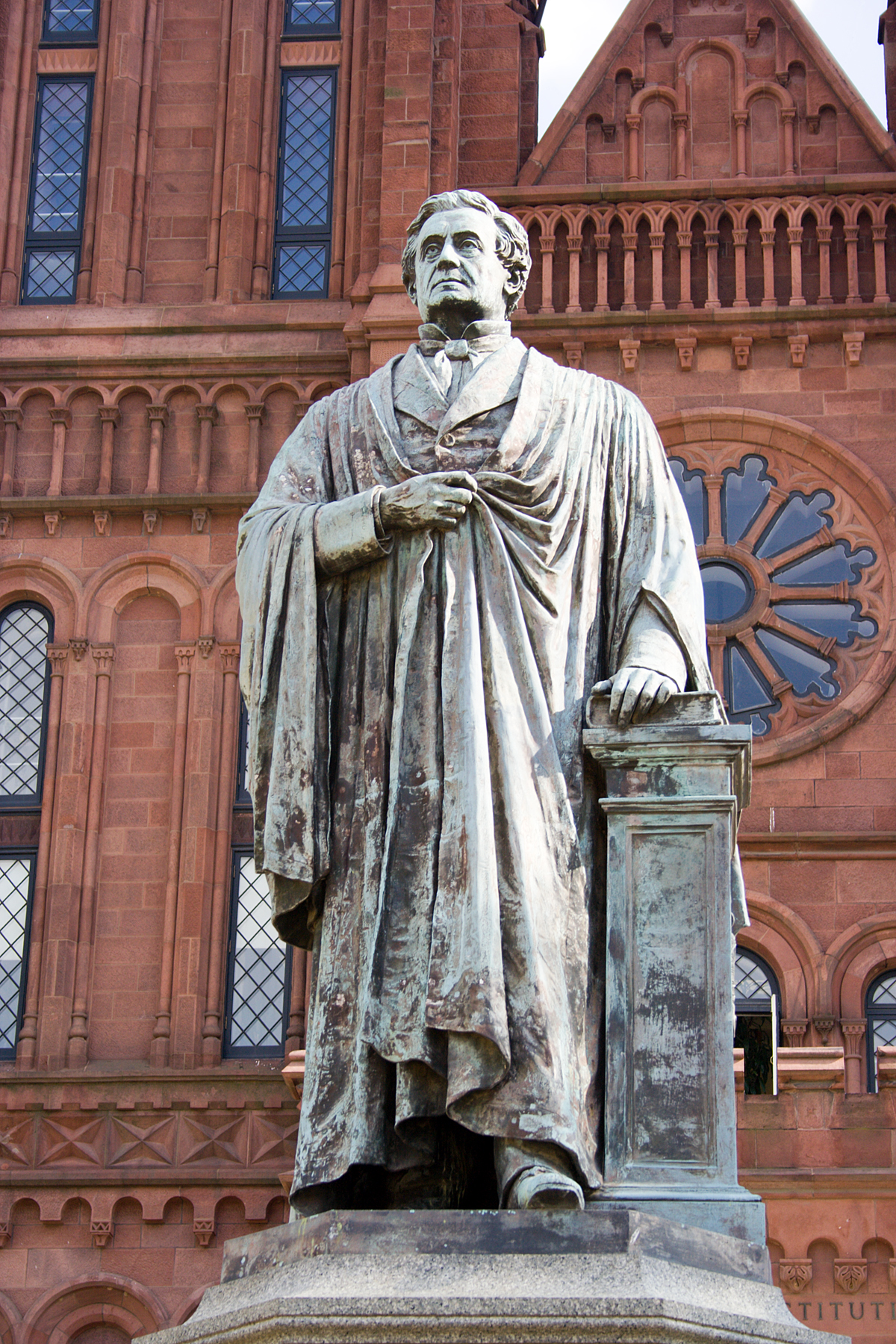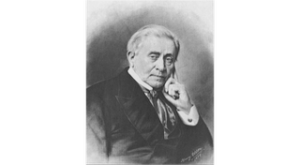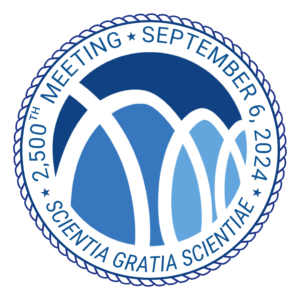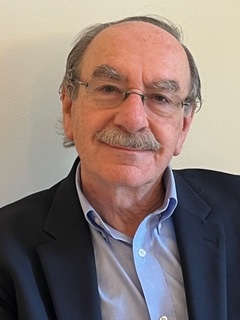The 2,500th Gala Meeting — “Uniting All the Men of Science in this City in One Organization”
Joseph Henry, the Philosophical Society of Washington, and the Status of Science in Post-Bellum Washington
Marc Rothenberg
Editor, The Joseph Henry Papers Project (Ret.)
Research Associate
Smithsonian Institution
Sponsored by PSW Science Member A.C. Charania & BAE Systems
About the Lecture

The selection of Joseph Henry, the Secretary of the Smithsonian Institution, as the first president of the Philosophical Society of Washington was just another acknowledgement that Henry was the leader of science in the United States. International renowned researcher, Presidential science advisor, President of the National Academy of Sciences, Henry held a status in this country unrivaled by any other scientist. When at the end of the nineteenth century sixteen individuals were selected to represent, in statuary in the rotunda of the Library of Congress, eight areas of human achievement, the two scientists were Isaac Newton and Joseph Henry. By studying the life of Henry we can illuminate three different themes in the history of nineteenth-century American science. One is the central role of organizations in the life of the scientist and the advancement of science. Science was not a solitary activity. Second, we see the growth of Washington as a center of scientific importance and the role of the Federal government in the advancement of American science. And last, but not least, we see that in some circles at least, science was recognized as a path of public service.


About the Speaker

Marc Rothenberg is a retired Federal historian, having spent nearly 30 years at the Smithsonian Institution with the Joseph Henry Papers Project and another seven as the agency historian for the National Science Foundation. In addition to his work on Henry and the early history of the Smithsonian Institution, he has worked on science education in the nineteenth-century U.S., the relationship between professionals and amateurs in astronomy, and the role of the Federal government in the funding of science. As Editor of the Henry Papers, he oversaw the publication of volumes 6 through 11, documenting Henry’s life in Washington. Among his publications is a two-volume critical and selective bibliography of the history of science and technology in the United States. He was general editor of the Garland Encyclopedias in the History of Science. He has served as President of the Society for History in the Federal Government, Chair of the Historical Astronomy Division of the American Astronomical Society, and Treasurer of the History of Science Society. The Henry Papers volumes received the Thomas Jefferson Prize for Documentary History from the Society for History in the Federal Government and the Eugene S. Ferguson Prize from the Society for the History of Technology. His undergraduate work was in astronomy at Villanova University and his graduate work in the history of science was at Bryn Mawr College.
Minutes
Gala Celebration and Dinner:
On September 6, 2024, in the Warne Ballroom of the Cosmos Club in Washington, D.C., President Larry Millstein opened the Gala Celebration and Dinner commemorating the Society’s 2,500th meeting. President Millstein welcomed guests, thanked past PSW Presidents Willard Grant, Bill Spargo, Bod Hershey, John Ingersoll and Robin Taylor who were among the guests at dinner. He then thanked the sponsors of the event - PSW Member A. C. Charnia and BAE Systems.
Prior to the dinner, tours of the Cosmos Club were offered to all attendees. Each guest received a copy of Volume 17 of the PSW Bulletin containing: formative papers of the Society, President Joseph Henry’s inaugural address to the Society, several histories of the Society, a paper by the night’s speaker, historian Marc Rothenberg, a list of PSW Presidents and Joseph Henry Lecture Speakers, and the minutes of several historical presentations to the Society. Each guest also received a medallion commemorating the occasion, and a printed program with the itinerary of the evening, notable quotations about the Society’s purposes and constitution, and well wishes from prominent scientists including several Nobel laureates and many leaders of agencies and notable scientific organizations.
A short video, produced by the General Committee during the COVID lock-down, was played for the audience, describing much of the Society’s history. President Milstein then commended the guests to enjoy the dinner.
At the end of the dinner, President Millstein made the first ceremonial cut of a commemorative cake commissioned in the image of the Smithsonian Castle including the outward-facing statue of Joseph Henry, flanked by the memorial medallion and the “PSW Science” logo. The table was set with Prosecco in flutes and President Millstein led those assembled in three ceremonial toasts: to Joseph Henry, to Science, and to the Society. After the President’s toasts, a member asked all in attendance to raise their glasses once more, for a toast to President Milstein.
Thereafter, the 103 guests enjoyed the cake and then proceeded to the Powell Auditorium for the remainder of the evening’s proceedings and the lecture by Marc Rothenberg.
Meeting:
On September 6, 2024, in the Powell Auditorium of the Cosmos Club in Washington, D.C., President Larry Millstein called the 2,500th meeting of the Society to order at 8:01 p.m. ET. He began by welcoming attendees, thanking sponsors for their support and announcing new members. Scott Mathews then read the minutes of the previous meeting which included the lecture by Ben Shneiderman, titled “Human-Centered AI: Ensuring Human Control While Increasing Automation”. The minutes were approved as read.
President Millstein then introduced the speaker for the evening, Marc Rothenberg, of the Smithsonian Institution. His lecture was titled “Uniting All the Men of Science in this City in One Organization: Joseph Henry, the Philosophical Society of Washington, and the Status of Science in Post-Bellum Washington”.
The speaker began by presenting some of the titles held by Joseph Henry at the time of his death in 1878: Secretary of the Smithsonian Institution, President of the National Academy of Sciences, President of the Philosophical Society of Washington, and the first Science Advisor to the President of the United States. The Federal Government was officially closed on the day of his funeral. Rothenberg then discussed several of the honors posthumously bestowed on Henry, including: The International Congress of Electricians naming the unit of inductance as the “Henry”, and the placement of a statue of Henry in the main reading room of the Library of Congress, next to the statue of Sir Isaac Newton.
Rothenberg then presented a brief chronology of Henry’s life: Born in Albany, NY in 1797. Teaches at Albany Academy from 1826 to 1848. Professor at the College of New Jersey (now Princeton University) from 1832 to 1848. Secretary of the Smithsonian Institution from 1846 until his death in 1878. Founder and First President of PSW from 1871 to 1878.
The speaker then discussed some details of Henry’s upbringing and young life. He was sent to live with his step-grandparents at the age of 8, due to the limited financial resources of his family. Henry’s father was an alcoholic, doomed to die in a fit of delirium tremens in 1811, when Henry was 13. Henry attended a village school in Galway, NY. In 1814 or 1815, he returned to Albany to live with his widowed mother, where he became an apprentice to a silversmith. Around this time, he discovered the book which he claimed changed his life: “Lectures on Experimental Philosophy, Astronomy, and Chemistry” by George Gregory. Henry attended the Albany Academy, where he would later begin his teaching career.
The speaker then listed many of Henry’s scientific contributions, including: developing exceptionally strong electromagnets, inventing the first electric motor, discovering that an electric current can be induced by magnetism, identifying mutual induction and self-induction, and discovering the concept of the transformer. Rothenberg claimed that while Michael Faraday’s name is most closely associated with these electromagnetic discoveries, the consensus view is that both men made similar discoveries, independently, at roughly the same time.
Rothenberg indicated that Henry advised both Samuel Morse and Alexander Graham Bell on technical issues associated with their inventions. He said that Henry’s later dispute with Morse is well known, as Henry’s publications represented a threat to Morse’s patent claims. The speaker said that Henry’s interactions with Bell were less known, but that Bell personally acknowledged Henry’s contribution to his invention of the telephone. Rothenberg mentioned several areas of research, beyond electromagnetism, to which Henry contributed: These included: optics, molecular forces, sun spots, acoustics, and phosphorescence.
The speaker then discussed Henry’s associations with other prominent American scientists of the time who were able to exert political influence; in particular, Alexander Dallas Bache, who was instrumental in Henry’s appointment as Secretary of the Smithsonian. Rothenberg said “Henry and Bache dominated Washington science for generations”. He gave several examples of how Henry used his influence with politicians to advance policies and secure funding for scientific research.
Rothenberg went on to discuss Henry’s role in the founding of the National Academy of Sciences, the “Saturday Club”, and PSW. The speaker discussed details about the first PSW meeting taken from Henry’s diary entries, and Henry’s last scientific talk, which was presented at PSW. He went on to discuss J. Wesley Powell and the founding of the Cosmos Club, and its relationship with PSW.
The speaker concluded his talk by saying “PSW continues, through its presentations, to carry out Henry’s charge to the organization to diffuse knowledge and stimulate scientific advance.”
The lecture was followed by a Question and Answer session:
A member asked how the society was able to continue and grow after Henry’s death. Rothenberg responded by saying that the need for a place like PSW was widely recognized by the scientific community, and specifically by J. Wesley Powell. He also indicated that the Cosmos Club provided an important social function, offering food, drink, and a place for smoking cigars and playing billiards.
A member asked about the “golden age of science”. Rothenberg said that government funding for science was a significant fraction of the federal budget during Henry’s lifetime. He claimed that as the size of the government grew, the fraction of the budget dedicated to science decreased, but that every time a war occurred, there was a surge in scientific funding.
A member (through president Milstein) asked about Henry’s view on natural theology. Rothenberg said that Henry was a staunch Presbyterian, and that he believed in the resurrection and eternal life. He argued that most scientists of the time believed in God.
A member asked if, in Henry’s letters, there was any reference to black scientist of the time, specifically mentioning “Solomon” (presumably Solomon Brown), Marsh (presumably Othniel Marsh), and Cope (presumably Edward Cope). Rothenberg indicated that although Solomon Brown worked for Spencer Baird, the second secretary of the Smithsonian, he was not aware of any direct communication between Henry and Brown. He said that Henry did employ a “mulatto” as a lab assistant.
After the question and answer period, President Millstein thanked the speaker and presented him with a PSW rosette, a signed copy of the announcement of his talk, and a signed copy of Volume 1 of the PSW Bulletin. He then announced speakers of up-coming lectures, made a number of housekeeping announcements, and invited guests to join the Society. He adjourned the 2500th meeting of the society at 10:01 pm ET.
Temperature in Washington, DC: 21.7° Celsius
Weather: Partly cloudy
Audience in the Powell auditorium: 110
Viewers on live stream: 22 …for a total of 132 live viewers
Views of the video in the first two weeks: 528
Respectfully submitted, Scott Mathews: Recording Secretary